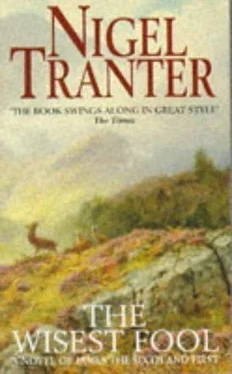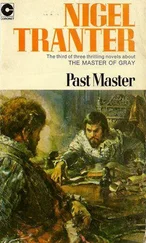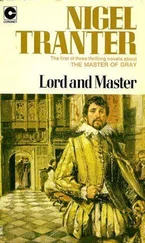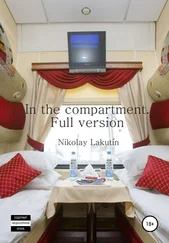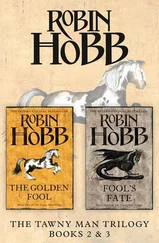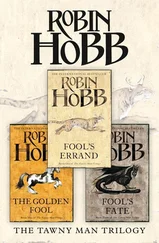Nigel Tranter - The Wisest Fool
Здесь есть возможность читать онлайн «Nigel Tranter - The Wisest Fool» весь текст электронной книги совершенно бесплатно (целиком полную версию без сокращений). В некоторых случаях можно слушать аудио, скачать через торрент в формате fb2 и присутствует краткое содержание. Жанр: Исторические приключения, на английском языке. Описание произведения, (предисловие) а так же отзывы посетителей доступны на портале библиотеки ЛибКат.
- Название:The Wisest Fool
- Автор:
- Жанр:
- Год:неизвестен
- ISBN:нет данных
- Рейтинг книги:4 / 5. Голосов: 1
-
Избранное:Добавить в избранное
- Отзывы:
-
Ваша оценка:
- 80
- 1
- 2
- 3
- 4
- 5
The Wisest Fool: краткое содержание, описание и аннотация
Предлагаем к чтению аннотацию, описание, краткое содержание или предисловие (зависит от того, что написал сам автор книги «The Wisest Fool»). Если вы не нашли необходимую информацию о книге — напишите в комментариях, мы постараемся отыскать её.
The Wisest Fool — читать онлайн бесплатно полную книгу (весь текст) целиком
Ниже представлен текст книги, разбитый по страницам. Система сохранения места последней прочитанной страницы, позволяет с удобством читать онлайн бесплатно книгу «The Wisest Fool», без необходимости каждый раз заново искать на чём Вы остановились. Поставьте закладку, и сможете в любой момент перейти на страницу, на которой закончили чтение.
Интервал:
Закладка:
"I see. You are exceeding noble in all this, Geordie Heriot! Why, I wonder?" "For my love for Your Majesty. And the King. That is all…"
"Aye-and your care for one, Mistress Alison Primrose! That she might be invited back to my Court and household, I think!" the Queen said shrewdly. "I am not a fool, my friend!"
A little put out-for it was near enough the mark; and a large part of the man's manoeuvring had been to ensure that Alison would not have to be implicated in the trial or called as witness, and so seem to oppose the Queen's interests-Heriot shook his head, perhaps too positively. "No, Madam-not that. Alison and I are to wed-as you will know. But it is the wish of neither of us that she should have any appointment at Court. Only, that as the wife of Your Majesty's jeweller, she should not be forever denied to come into your royal presence."
"I see. Very well, Master Geordie-that I might permit. If you can so arrange all this complicate matter, then you have my agreement to it. And, indeed, my thanks. When will it be done, think you?"
"It will all take some time to effect, I fear. Many letters to Scotland. Possibly a visit there again. And lawyers work but slowly. But, by the late spring, no doubt…"
Reasonably satisfied, George Heriot took his leave thereafter- and with the royal assurance that he was now, once again, welcome at Denmark House, on both professional and personal business, or no business at all. "With this last, especially, he was genuinely pleased.
His satisfaction, however, went for the moment into suspension when he got back to the Royal Exchange to find that during his absence no less a visitor than the monarch himself had called- and sounded not a little put out at finding his so-honoured tradesman from home. He had left commands with Heriot's foreman goldsmith that his master was to report at Whitehall Palace forthwith. Such summonses were by no means always productive of joy.
But at Whitehall, the urgency was not so apparent James was actually at table when Heriot arrived, not so much at a meal as at what might be described as an intellectual drinking exercise. It was held in the same gallery as that in which the judicial bewitchment-enquiry had taken place, but now the long table was littered with bottles and flagons instead of documents-although there were one or two dishes of cold meats and the like for those who felt that they required solids with their wine. And the company was very different, legal luminaries and litigants being equally and conspicuously absent Only courtiers were present, reinforced with a few selected divines of the rubicund and genial English sort, and no women. James, at the head of the table, was in full flood-although his preoccupation with the expounding and elaboration of his syllogisms and propositions did not prevent him from stroking, fondling and occasionally turning to kiss the gorgeous youth who sprawled at his side. He perceived Heriot's entrance, even so, and waved him to a chair near the foot of the table without pausing in his peroration.
The newcomer found himself seated between the former favourite, the Earl of Southampton, Knight of the Garter, and Sir Andrew Kerr of Ferniehirst, elder brother of the young man at the head of the table. Kerr, a cheerful if unscupulous extrovert, greeted him with a grin, and pushed a flagon and beaker towards him. Southampton was asleep and snoring gently. Directly across the table, while seeming to pay rapt attention to their liege lord's lengthy abstractions, two clients of Heriot's own, the Earl of Rutland and the Viscount Doncaster, were playing cards with miniatures behind an elaborate screen of feathered hats and bottles. From further up the table the Duke of Lennox drooped an eyelid at his friend and yawned carefully behind a hand.
The King was partial to these debating and syllogism sessions, in which he could display his learning and agility of mind. They were less popular with his courtiers-but very good excuses had to be tendered for non-attendance. The churchmen were there to provide the necessary vocal reactions-since the Court gentlemen, save for a few Scots, were almost without exception out of their depth from the first proposition. Also the divines were able sometimes to applaud the frequent Latin comments or aphorisms that fell from the salivating royal lips.
The present monologue-since it was that rather than any debate, at the moment-appeared to be concerned with the nature and identity of the language spoken in the Garden of Eden, James declaiming with an authority rivalled only by its lack of clarity. It seemed that his illustrious great-grandfather, James the Fourth of hallowed memory, had had similar conjectures, and for experiment had deposited two new-born infants, with a deaf-and-dumb wet-nurse, plus a large supply of food and drink, on the otherwise uninhabited islet of Inchkeith in the Firth of Forth, in the confident expectation that they would grow up, uncontaminated by the rest of the world, to speak the basic language of all humanity -which inevitably would be that of Adam and Eve, and therefore of Heaven itself. Unfortunately the second winter later prolonged gales prevented food being landed for the experiment for a couple of awkward months, and an excellent piece of research was spoiled through the death of all concerned. James, it transpired, had frequently thought of making a scientific investigation of his own, on similar lines-and might well do so yet. But meantime, his confident contention was that Gaelic was undoubtedly the language of Eden, and Heaven itself.
This averment aroused not a little doubt around the table, even from some who had appeared to be elsewhere in spirit. Nobody actually was so unwise as to challenge the statement, of course, at this early stage; but not a few eyebrows rose.
James nodded happily-and proceeded to prove his point. The Gaels of Scotland had migrated over long centuries to their present home in the north-west extremity of Europe, via the Mediterranean lands, and Spain, France and Ireland, leaving the names of Galicia, in Spain and Gaul, for France, behind them in the process. But they had first come from the very cradle of mankind, in Asia Minor. The Garden of Eden was known to have been sited, not in the Holy Land but to the north-east thereof, in the heart of Asia Minor, where the great River the Euphrates rose. And what was the name of that heartland? Galatia. Galatia, whence came the Gaels. The same to whom St. Paul wrote his epistle. The Gaelic-speaking people of Scotland, therefore, were the true and most dhect hehs of Adam and Eve, and their language the mother-tongue of all other languages on earth If any doubted this, let them consider-take the simple word cuibhle, pronounced cooyul, Gaelic for circular. From this came the English wheel and whirl and curl. From the same root came wirren, to twist, in German; virer, to turn, in French; vermis, a worm and verter, to turn, in Latin; vermicelli, in Itahan, Krimi in Sanskrit. And so on. Could any doubt, then, that the Gaelic was the language of Heaven, the Scots the heirs of Adam, and he the heir of Scotland -and so well-suited to be Vice-Regent of Christ Himself? He would be interested to hear any who contested his reasoning.
While, after a somewhat stunned silence, all disclaimed any such presumptuous assertion, and one of the divines launched into a fulsome eulogy of this resounding proposition, which explained so much of the heavenly wisdom which fell from the royal lips, James took the opportunity to use the said lips to plant a slobbering kiss on those of young Carr, and obviously to fiddle about with him below the table. The youth smiled lazily.
Carr was beautiful, there was no denying that. From a rather awkward boy he had blossomed into a fair and graceful young man, tallish, broad of shoulder and narrow of hip, with curling auburn hah, worn long, above a wide brow, long-lashed and rather prominent eyes, a straight nose and full pouting lips, moistly red. Dressed all in cloth-of-silver, seeded with pearls, beribboned in blue, with cheeks and finger-nails as red as his lips, he lounged at amiable ease. Heriot, looking, wondered how much financial astuteness could he beneath that complacently immature exterior -and, if little, who was "managing" him?
Читать дальшеИнтервал:
Закладка:
Похожие книги на «The Wisest Fool»
Представляем Вашему вниманию похожие книги на «The Wisest Fool» списком для выбора. Мы отобрали схожую по названию и смыслу литературу в надежде предоставить читателям больше вариантов отыскать новые, интересные, ещё непрочитанные произведения.
Обсуждение, отзывы о книге «The Wisest Fool» и просто собственные мнения читателей. Оставьте ваши комментарии, напишите, что Вы думаете о произведении, его смысле или главных героях. Укажите что конкретно понравилось, а что нет, и почему Вы так считаете.
